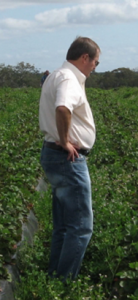About Us
A History in Biological Agriculture
Tainio Biologicals, Inc. has been there from the beginning. Nearly forty years ago, when soil biology was rarely discussed and scarcely understood by farmers and consultants, the folks from Tainio were fully engaged in the business of biological agriculture, providing education, programs, and state of the art products for creating healthy, living soils. Over the years, we’ve developed a reputation of excellence and integrity, and an expertise unsurpassed in the industry that growers have come to trust and depend on.
Our Founder
 Bruce Tainio (May 16, 1944 – December 31, 2009)
Bruce Tainio (May 16, 1944 – December 31, 2009)
Our founder, the late Bruce Tainio received his formal education at Eastern Washington University, majoring in Biology. As a part of his curriculum, Bruce spent a year traveling the world, collecting and cataloging field data and food crops in various countries.
In the early 1960s, Bruce began his career as a plant breeder and microbiologist. During that time, he developed many food crop and flower seed varieties for seed companies around the world. Early in his career, Bruce came to realize that conventional NPK growing practices and over-use of agricultural chemicals were destroying the earth’s natural ecosystem, lowering crop productivity and the nutritional value of our food. In his continuous quest for excellence, he began studying the role of microbial activity in the soil and how it affected the health of plants.
In 1985, Bruce started Tainio Technology & Technique, Inc. as a specialty seed company. During this early period, Bruce developed many crop and commercial seed varieties, all raised with special attention to balanced plant nutrition and good soil biology.
By 1987, Bruce had developed a successful biological crop management program, making Tainio Biologicals, Inc. what it is today.
Testimonials
“Our avocados continue to improve each year under the Tainio products and protocols as the soil becomes closer to nutrition balance. Root rot has significantly declined and tree removal due to this disease has gone to zero from an annual rate of 3%. Crops are more abundant and alternate bearing has declined. The grove looks fantastic! I thank you for all of the guidance and counsel!”
– M. Crumb, California
